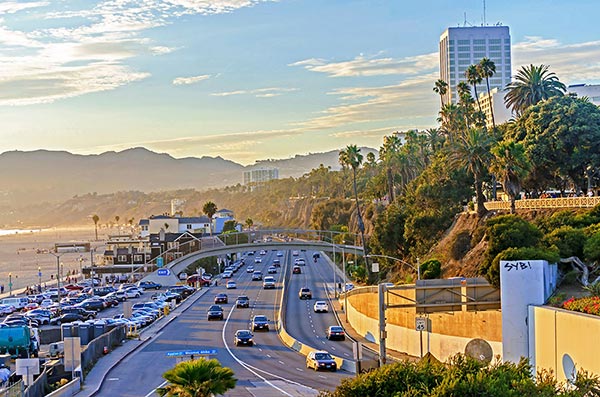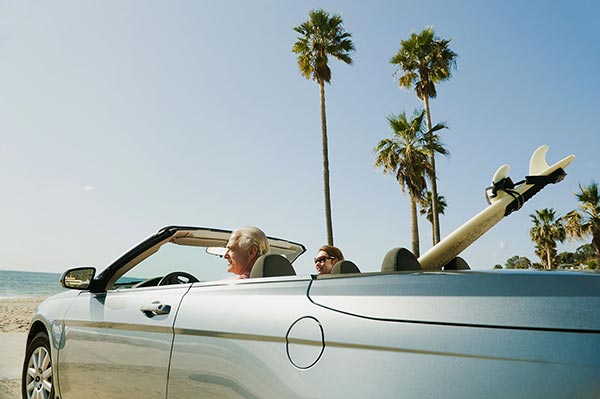California Car Insurance - Get an Auto Insurance Quote
Auto Insurance Quotes in California
 If you just moved to California and need auto insurance coverage, or you've been here for a while and are looking for affordable car insurance that doesn't cut corners, you'll be glad you got a quote with GEICO. How much is car insurance in California for your ride? You can get a free car insurance quote with GEICO online to find out. California also has some unique car insurance laws that make insuring a vehicle here different than other states, so read on to stay up to speed.
If you just moved to California and need auto insurance coverage, or you've been here for a while and are looking for affordable car insurance that doesn't cut corners, you'll be glad you got a quote with GEICO. How much is car insurance in California for your ride? You can get a free car insurance quote with GEICO online to find out. California also has some unique car insurance laws that make insuring a vehicle here different than other states, so read on to stay up to speed.
California Car Insurance Requirements
California requires drivers to carry at least the following auto insurance coverages:
Bodily injury liability coverage: $30,000 per person / $60,000 per accident minimum
Property damage liability coverage: $15,000 minimum
Uninsured and underinsured motorist bodily injury coverage*¹: $30,000 per person / $60,000 per accident minimum
Uninsured motorist property damage coverage*¹: $3,500 minimum
*Uninsured motorist coverages may be rejected in writing
While these are the minimum coverages California requires you to have, everyone's insurance needs are unique. Visit our Coverage Calculator to get a personalized recommendation.
California Car Insurance Laws for New Residents
If you're moving to the state, the California Driver Handbook is a good resource. It's published by the Department of Motor Vehicles. It can provide you with guidance on registering your car, obtaining a California driver's license and important state rules of the road.
Learn more about California auto insurance requirements.
What is the California Deductible Waiver?
- If you carry collision coverage on your car, then you may be eligible for the California Deductible Waiver. With this waiver, your insurance company will pay the collision deductible on your car if an uninsured driver causes an accident.
California Registration Information
Your vehicle may be subject to California registration from the date of entry. Fees must be paid within 20 days from the date the vehicle entered California to avoid penalties.
You will need to:
- Complete an Application for Title or Registration (REG 343)
- Submit your out-of-state registration certificate
- Submit your out-of-state title (If you have it)
- Provide evidence of the California Smog Certification
- Provide an odometer mileage certification (If your vehicle is less than 10 years old)
- Bring your vehicle to a DMV office for verification of the vehicle's identification number. (For your convenience, we recommend that you schedule an appointment by calling your local DMV.)
- Pay the fees
- Commercial vehicles, including pickup trucks, may also require a weight certificate
Existing law imposes a use tax on a vehicle purchased outside of California and brought into California within 12 months of purchase. New legislation requires payment of use tax on a vehicle purchased outside California and brought into California within 365 days of the purchase date.
What do I do if I get a California Intent to Suspend Registration letter?
- If the state of California cannot confirm that you have insurance on your vehicle, you may receive a letter stating that it plans to cancel your car's registration. This can happen if the state doesn't have the correct VIN (Vehicle Identification Number) on file, if your California (or out of state) insurance coverage has lapsed, or if there's an error in the information that the state of California received.
- If you are a current GEICO policyholder and the California DMV has informed you that providing proof of insurance is enough, you can easily obtain the documents through our GEICO Mobile app.
- If you are not a GEICO policyholder and would like to know how much it would be to obtain California car insurance, you can get a quote today.
CA Good Driver Car Insurance Discount
 Good drivers deserve a break, and in California, those who meet certain criteria could receive a discount on their auto insurance premium. In California, a Good Driver is one who²:
Good drivers deserve a break, and in California, those who meet certain criteria could receive a discount on their auto insurance premium. In California, a Good Driver is one who²:
- Has verifiable license experience for at least the previous three years; or
- Has been licensed in the United States or Canada for the most recent 18 months, which experience must be verifiable, and certifies the previous 18 months of license experience in any jurisdiction outside of the United States or Canada; and
- Has not accrued more than one Department of Motor Vehicles point in the last three years. A point is usually assigned for a vehicle code violation or a "principally at-fault" accident³; and, if the driver was involved in a "principally at-fault" accident, it must not have resulted in injury or death; and
- Has not had a conviction during the past ten years for specific driving under the influence (drug or alcohol) related driving offenses or specific felony convictions4.
Speak to one of GEICO's auto insurance agents, if you have any questions.
California Good Student Car Insurance Discount
California drivers may qualify for a Good Student Discount, if they meet all of the following criteria:
- Have eight years or less of driving experience
- Are enrolled in a full-time academic home study program, high school, college, or university.
- Have at least a B average or its equivalent.
Get a quote today to see how much you could save with a Good Student Discount.
Additional Car Insurance Coverages in California
In California, drivers are required to carry minimum liability insurance, but there are several optional coverages available that can offer additional protection and peace of mind, including:
- Comprehensive Coverage: Covers non-collision incidents such as theft, vandalism, fire, natural disasters, and falling objects. You will likely be required to have this coverage if you lease or finance your vehicle.
- Collision Coverage: Pays for damage to your vehicle in the event of an accident, regardless of who is at fault. You will likely be required to have this coverage if you lease or finance your vehicle.
- Mechanical Breakdown Insurance (MBI): Covers the cost of repairs to major vehicle systems, such as the engine or transmission, outside of normal wear and tear, similar to an extended warranty.
- Rental Car Reimbursement: Pays for a rental car if your vehicle is being repaired due to a covered incident.
- Emergency Roadside Service: Provides help if your car breaks down, offering services like towing, tire changes, or battery jump-starts.
California Teen Driving Laws
 If you're the parent of a teen who is getting close to the driving age, you and your teen should know that:
If you're the parent of a teen who is getting close to the driving age, you and your teen should know that:
- Before becoming fully licensed, California teen drivers must complete driver training and get a provisional permit, which they must be at least 15½ years of age to obtain.
- Before applying for a license, drivers in California must be 16 years of age and have had a provisional permit for at least six months.
- Applicants must then pass the DMV administered driving test before receiving a provisional driver's license.
- During the first 12 months of the provisional license, they may drive between 5:01 am and 10:59 pm and only transport passengers over age 21. After that provisional period ends, they're granted full driving privileges.
Check with your local California DMV for more info on California teen driver rules and laws.
California Driving and Car Insurance Resources
Check out how we're making insurance easier in the app with 1 click bill pay, digital ID cards, access to emergency roadside service, and more. Download GEICO Mobile today. We make insurance easy.
Get a California Car Insurance Quote with GEICO
Ready to protect your vehicle with the right coverage? Get a fast, free California car insurance quote from GEICO today! Visit our website, download our app, or call us at (800) 207-7847 to get started. Simply provide some basic information about your vehicle and driving history, and we’ll help you find the best coverage at an affordable rate.
FAQs About Auto Insurance in California
-
How Much Is Car Insurance Per Month in California?
Car insurance premiums in California vary based on several factors, including your driving history, the type of vehicle you drive, your location, and the coverage options you choose, to name a few. To get an accurate estimate, it's best to request a personalized quote.
-
What Are the Penalties for Driving Without Auto Insurance in California?
In California, driving without auto insurance can result in fines, vehicle impoundment, and suspension of your driver's license. In more severe cases, your vehicle's registration may be revoked.
-
Do I Need to Have Car Insurance Before I Register my Car in California?
You must have car insurance before you can register your vehicle in California. The state requires proof of insurance that meets the minimum liability coverage requirements to complete the registration process.
-
Is California a No-Fault State?
California is not a no-fault state. This means the driver found responsible for an accident is liable for the damages. Injured parties can file claims with the at-fault driver's insurance or pursue legal action to recover compensation.
-
Why is it Difficult to Get Car Insurance in California?
It can be difficult to get car insurance in California due to high accident rates, traffic congestion, and the state's exposure to natural disasters, contributing to higher risk for insurers.
-
How Does Car Insurance Differ Depending on Where I Live in California?
Car insurance rates in California can vary significantly depending on where you live, with urban areas like Los Angeles, San Francisco, and Oakland typically having higher premiums due to higher traffic density and accident rates. Drivers in smaller cities or rural areas, such as Fresno or Bakersfield, may pay lower rates because of reduced traffic and fewer claims.
- Uninsured Motorist coverages can be waived.
- As defined by CIC § 1861.025
- As defined by California Code of Regulations Title 10 § 2632.13
- California Vehicle Code, per CIC § 1861.025
Contact Us
We're here for you 24 hours a day, 7 days a week. The quickest way to contact us is through our app or online. You can also chat for immediate help.
Check Out a New Quote
You are about to leave geico.com


